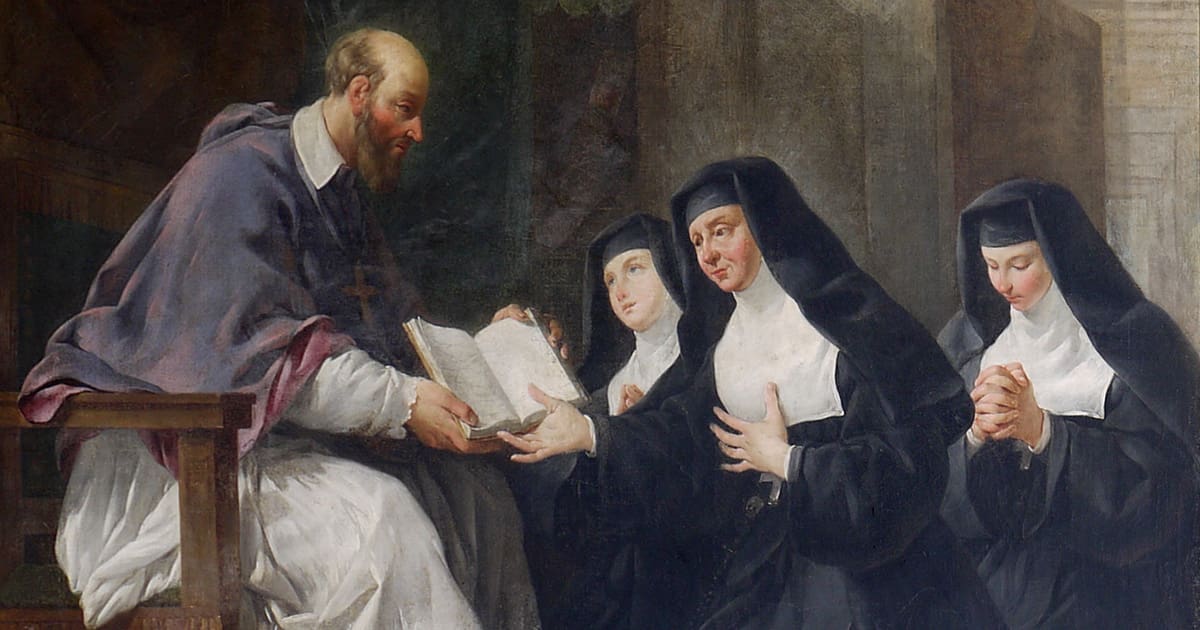Even in seasons of loneliness, we were made to live with and for others. God provides the means to serve him through a community.

Image: Saint Francis de Sales giving Saint Jeanne de Chantal the rule of the order of the Visitation by Noël Hallé (detail)
What will the coming months bring? Ever since Covid, it seems to me that everything has shifted, that I am like a boat cut loose from its moorings, victim to a merciless sea.
More and more, I find myself turning to the saints. Their lives have become my daily comfort, their words my go-to reading, as the news of the world has become more and more disturbing. When I feel utterly lost, the saints center me and convict me. They witness to facts that challenge my prevailing fears. They show me that peace and freedom can be had even in the most harrowing circumstances — that darkness does not have to triumph. They promise that we are not alone.
I used to think that the saints’ lives had nothing do with the confusion that has troubled me in mine. They were fairy-tale figures who lived in a rosier time, a Catholic Golden Age. When I began to spend time with the saints, to let their stories penetrate my heart, I began to see things differently. These encounters with them have changed me — have changed the ways I think, work, and pray. Slowly but surely, the neural networks of my soul are being reprogrammed. And I thank God!
The life of the woman we celebrate August 12, St. Jane Frances de Chantal, is a great example. Born in 1572 of French nobility, Jane lost her mother in infancy and was educated in large part by her father. At the age of 20, she married a wealthy baron and bore him six children in quick succession, even as she managed his large estate. Then, eight years into the marriage, tragedy struck. Just two weeks after Jane had given birth to their sixth child, her beloved husband Christophe arrived home from a hunting accident gravely wounded.
His death began a time of great difficulty for Jane. In order to protect her children’s inheritance, Jane had to move in with her father-in-law, a disagreeable man on the best of days, and his conniving head housekeeper, who resented Jane’s presence and did everything possible to thwart her. For years, all Jane could do each day was put her head down and try to attend to her children.
Through it all, a sense was growing within her that there was something God wanted of her. She gave away her fine things, succored the poor, and found time for prayer. It was in prayer that she received a vision of the man whom God would give her as the director of her soul. And in Lent of 1604 she recognized him, as he delivered a sermon in the Sainte Chapelle in Dijon. It was Francis de Sales, bishop of Geneva and future Doctor of the Church. She went to him at once for spiritual advice, and he immediately gave it: “Do everything through love and nothing through constraint.” His words breathed freedom into every corner of her life.
Francis became Jane’s spiritual director. She followed him without question. But the relationship was hardly one-sided. Francis had envisioned the founding of an order of women religious, and Jane’s longing to give herself totally to God was fulfilled when she, in 1610, took on this endeavor.
Jane’s surviving letters show with what intelligence and sense she managed the rapid growth of the Visitation nuns in the years that followed. They also reveal Jane’s incredible strength in the face of personal losses and spiritual trials — the painful feeling of abandonment that spiritual authors call the “dark night.” After Francis de Sales died, another great saint, Vincent de Paul, became her spiritual director. Vincent attested that Jane was “one of the holiest people I have ever met on this earth.”
There is much in Jane’s story that tracks with the life of St. Elizabeth Ann Seton. Like Jane, Elizabeth lost her husband to untimely death and suffered hardships as a result. She had a knack for leadership and flourished in the challenging work of founding an order. And she found strength in the friendship of strong Catholic men: first the Filicchi family in Italy, and then in America the priests who guided her and supported her — above all her own spiritual director, Fr. Simon Bruté.
This last point is what strikes me most about both Jane and Elizabeth. Both women had a capacity for friendship that enabled them to grow and flourish even amid great personal loss and turmoil. Friendship was not just icing on a spiritual cake; it defined for them what it is to be human.
And we can see, too, that both Jane and Elizabeth experienced the affection, help, and companionship of their friendships as divine gifts. They lived in the expectation that they were not alone. They counted on God to send them friends, companions on the journey. These women testify to a profound truth: our destiny is a life lived for and among others.
This is the kind of truth that I need to have trickle into my life, spread through my soul: I am not alone. I want to be confident of my end, the fullness of life with God and his saints. In this moment of confusion, I want to confess: I am not made to perish alone on a sea of worries. I am made for life, for the abundance of life.
LISA LICKONA, STL, is Assistant Professor of Systematic Theology at Saint Bernard’s School of Theology and Ministry in Rochester, New York, and a nationally-known speaker and writer. She is the mother of eight children.
Source: https://setonshrine.org/





0 Comments